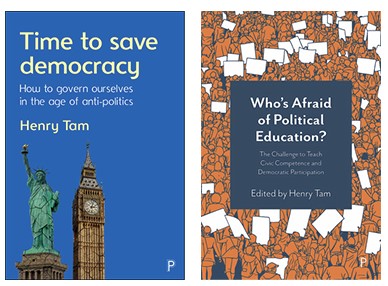There was a time when we had a government in the UK that wanted to strengthen democracy. Under Labour, 17 years ago today, the Electoral Administration Act 2006 was passed.
Among other things, it:
- reduced the age of candidacy for public elections from 21 to 18;
- required local authorities to promote and encourage electoral registration and voting; and
- made it a criminal offence to supply false electoral registration details.
The 2006 Act received royal assent and was passed on 11 July. Not quite as momentous a date as 4 July, but a significant reminder nonetheless that democracy cannot be secured by any one-off declaration. Sustained efforts are needed to safeguard and improve it.
Alas, since 2010, democracy has suffered from not mere neglect, but from multiple attempts by Conservative-led governments to undermine democratic participation. In 2014, the method for electoral registration was changed despite warnings that it would cause a lot of potential voters – especially youngsters and those in poor, transient households – to drop off the register. That is exactly what happened.
To put off even more people from getting electorally involved, the Conservatives brought in the Elections Act 2022 which required photo identification for anyone wanting to vote in person, knowing that young people and those on lower income are less likely to have a passport or driving licence.
The 2022 Act also put an end to the Electoral Commission’s independent status that had up until then enabled it to challenge the government – the commission would be placed under the supervision of a government minister. It’s unlikely that it would in future publicly castigate a Tory government for breaching electoral funding rules as it had done in the past.
All these insidious manoeuvres have been taking place with no major public outcry – not because people are content to have their electoral influence diminished, but because they are not aware of what is being done and what impact it could have. If only people had generally acquired an early interest in and understanding of how politics works, gone on to listen out for what implications various policy proposals might have, and followed through to use their vote to steer power towards where it would make the most positive difference.
For that to happen, we need extensive, high-quality political education. What we get from the Conservative government, however, is guidance to schools instructing them to refrain from teaching anything which could be regarded as breaching ‘political impartiality’. And is political impartiality to be determined by an independent body guided by non-partisan experts? No, what is or is not an issue that is too ‘contested’ to teach is to be judged by the Conservative Secretary of State for Education, guided by politically appointed advisors aligned with the interest of the Conservative Party.
Climate change apparently can be talked about at school, but not the ideas concerning what could be done about it, since that might involve policy suggestions that the government would contest. Similarly, race inequality can be mentioned, but not ideas about what are the causes and what might remedy it, since that might also involve explanations the government would contest.
In short, anything the government does not agree with, and thus is inclined to contest as mistaken would be classified as unsuitable to teach at school. Political education would then be reduced to passing on information that the government is happy to endorse, but it would be cut off at any point it raises awareness of any fact, arrangement or practice that the government prefers to keep opaque.
But isn’t it impossible to teach politics without getting tangled up with party politics? On this, there are two important points to note. First, scientists, engineers, doctors, economists, historians, etc. all develop expertise in their fields and pass on their findings and criticisms to others who seek to learn from them – regardless of whether or not the government of the day finds it inconvenient to hear those ideas and thus wish to contest them. Secondly, apart from facts and analyses relating directly to political processes, there are many skills that political education would inculcate – critical reasoning, assessing the reliability of claims made on different media platforms, conflict resolution, consensus building, fact checking, group development, empathic listening, etc. Some politicians may be against the teaching of such skills – as they make it so much more difficult to deceive and manipulate people – but anyone who cares about democracy should welcome their cultivation.
Henry Tam is a writer, educator, and former policy head for civil renewal under the last Labour Government.

Time to Save Democracy and Who’s Afraid of Political Education? by Henry Tam are available on the Bristol University Press website. Order here and here for £22.99 and £80.00.
Bristol University Press/Policy Press newsletter subscribers receive a 25% discount – sign up here.
Follow Transforming Society so we can let you know when new articles publish.
The views and opinions expressed on this blog site are solely those of the original blog post authors and other contributors. These views and opinions do not necessarily represent those of the Bristol University Press and/or any/all contributors to this site.
Image Dan Dennis via Unsplash


